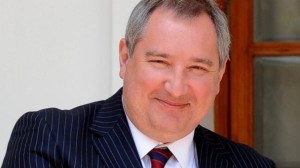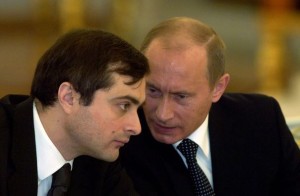redo Jump to...
print Print...

Russia’s deputy prime minister Dmitry Rogozin
(by Kirit Radia, ABC News) MOSCOW – Russia’s deputy prime minister Dmitry Rogozin laughed off President Obama’s sanctions against him on Monday, asking “Comrade @ BarackObama” if “some prankster” came up with the list.
The Obama administration hit 11 Russian and Ukrainian officials with sanctions as punishment for Russia’s support of Crimea’s referendum. Among them: aides to President Vladimir Putin, a top government official, senior lawmakers, Crimean officials, the ousted president of Ukraine, and a Ukrainian politician and businessman allegedly tied to violence against protesters in Kiev.
It remains to be seen whether the sanctions will dissuade Russia from annexing Crimea, but one an early clue that they will not be effective came just hours later when President Putin signed a decree recognizing Crimea as an independent state, perhaps an early step towards annexation.
U.S. official have warned of additional sanctions for Russian action, hoping it will deter Russia from any further aggression towards Ukraine, but it didn’t appear to upset the often outspoke Deputy Prime Minister Dmitry Rogozin.
Rogozin, a friend of actor Steven Seagal, took to Twitter to tweak Obama, tweeting he thinks “some prankster” came up with the sanctions list.
In a later tweet addressed to “Comrade @ BarackObama,” he asked, “what should do those who have neither accounts nor property abroad? Or U didn’t think about it?”
Another Russian on the sanctions list, Vladislav Surkov, also seemed unconcerned.
Surkov, a top Putin ideologue often called the Kremlin’s grey cardinal, reportedly told a Russian newspaper, “It’s a big honor for me. I don’t have accounts abroad. The only things that interest me in the U.S. are Tupac Shakur, Allen Ginsberg, and Jackson Pollock. I don’t need a visa to access their work. I lose nothing.”
Here’s who gets hit with the sanctions:
U.S. officials said that, among the sanctioned individuals were the “key ideologists and architects” of Russia’s Ukraine policy, while adding that some of the Russian officials were included in the list for their role in curbing “human rights and liberties” in Russia.

Russian President Vladimir Putin (right) and Vladislav Surkov.
The sanctions freeze any assets under American jurisdiction and prevent American banks from doing business with the named individual, essentially freezing them out of the international banking system. The sanctions also impose a ban on their travel to the United States. Separately, but in coordination with the White House, the European Union announced sanctions today on 21 individuals that it plans to name later. U.S. officials told reporters that the American and European lists “overlapped” in some area, but declined to say how.
While some of the sanctioned officials are bold faced names, the White House move is unlikely to affect Russia’s decision making with regard to Crimea’s bid to join the Russian Federation. Russia’s stock market actually improved on the news that so few officials were included on the list. U.S. officials warned that, if Russia does go ahead with annexation of Crimea, additional penalties will follow, with more, harsher measures to come if Russia attempts to enter eastern Ukraine.
Reprinted here for educational purposes only. May not be reproduced on other websites without permission from CBS News. Visit the website at cbsnews .com.
NOTE: On March 13 the Wall Street Journal reported on Ukraine’s request for military aid from the U.S.:
Ukraine’s interim government has appealed for U.S. military aid, including arms, ammunition and intelligence support, according to senior U.S. officials. But the Obama administration has agreed to send only military rations for now, wary of inflaming tensions with Russia.
The U.S. decision reflects the Pentagon’s reluctance to be seen as directly supporting Ukraine’s beleaguered armed forces during the standoff with Russia, which has seized the Ukrainian region of Crimea.
“It’s not a forever ‘no,’ it’s a ‘no for now,'” a senior U.S. official said of Ukraine’s request for lethal military support.
Questions
1. Define sanctions.
2. a) Who did President Obama impose sanctions on on Monday? Be specific.
b) What is the purpose of these sanctions?
3. What will the sanctions on this group of people actually do/prevent them from doing?
4. How did these officials respond to the sanctions imposed on them?
5. What does the ABC News report say is a clue that these newly imposed sanctions will not be effective?
6. What do President Obama and the European Union plan to do if these sanctions do not result in their desired outcome?
7. a) Why do you think President Obama did not include President Putin on the list?
b) Do you think he should have done so for the sanctions to be effective?
c) Ask a parent and your teacher the same question.
Background
FROM A REUTERS REPORT ON THE WEST’S SANCTIONS ON RUSSIA:
The United States and European Union imposed personal sanctions on Monday on Russian and Crimean officials involved in the seizure of Crimea from Ukraine as Russian President Vladimir Putin signed a decree recognizing the region as a sovereign state.
The moves heightened the most serious East-West crisis since the end of the Cold War, following a disputed referendum in the Black Sea peninsula on Sunday in which Crimea’s leaders declared a Soviet-style, 97-percent vote to secede from Ukraine.
Within hours, the Crimean parliament formally asked that Russia “admit the Republic of Crimea as a new subject with the status of a republic.” Putin will on Tuesday (March 18) address a special joint session of Russia’s State Duma, or parliament, which could take a decision on annexation of the majority ethnic-Russian region.
That would dismember Ukraine, a former Soviet republic once under Moscow’s thumb, against its will. Kiev and the West said the referendum, held under armed Russian occupation, violated Ukraine’s constitution and international law.
Russian forces took control of Crimea in late February following the toppling of Ukrainian President Viktor Yanukovich after deadly clashes between riot police and protesters trying to overturn his decision to spurn a trade and cooperation deal with the EU in favor of cultivating closer ties with Russia.
U.S. President Barack Obama slapped sanctions on 11 Russians and Ukrainians blamed for the seizure, including Yanukovich, and Vladislav Surkov and Sergei Glazyev, two aides to Putin. Putin himself, suspected in the West of trying to resurrect as much as possible of the former Soviet Union under Russian leadership, was not on the blacklist. A White House spokesman declined to rule out adding him at a later stage.
Amid fears that Russia may move into eastern Ukraine where there is a significant Russian-speaking community, Obama warned that “further provocations” would only increase Moscow’s isolation and exact a greater toll on its economy. “If Russia continues to interfere in Ukraine, we stand ready to impose further sanctions,” he said.
A senior U.S. official said Obama’s order cleared the way to sanction people associated with the arms industry and targets “the personal wealth of cronies” of the Russian leadership.
In Brussels, the EU’s 28 foreign ministers agreed to subject 21 Russian and Ukrainian officials to visa restrictions and asset freezes for their roles in the events. They included three Russian military commanders in Crimea and districts bordering on Ukraine.
There were only three names in common on the U.S. and European lists – Crimean Prime Minister Sergey Aksyonov, Crimean parliament speaker Vladimir Konstantinov and Leonid Slutski, chairman of the Russian Duma’s committee on the Russian-led Commonwealth of Independent States (CIS), grouping former Soviet republics. The EU blacklisted Yanukovich earlier this month.
The U.S. list appeared to target higher-profile Russian officials close to Putin, including a deputy Russian prime minister, while the EU went for mid-ranking officials who may have been more directly involved on the ground.
Washington and Brussels said further steps could follow in the coming days if Russia does not back down and formally annexes Crimea.
Russian Deputy Prime Minister Dmitry Rogozin, who was named on the White House sanctions list, suggested that the measures would not affect those without assets abroad. (from reuters)
LIST OF RUSSIANS AND UKRAINIANS SANCTIONED BY THE OBAMA ADMINISTRATION: (from the ABC News report)
Kremlin aides
- Vladislav Surkov – An aide to President Vladimir Putin, he was once considered one of Russia’s most powerful men. He has been called the Kremlin’s “gray cardinal” for his role as a power broker behind the scenes. He’s also credited the architect of Russia’s political system, with power concentrated in the presidency. In the past he was credited with shaping the ideology of the ruling United Russia party. He has also written rock music lyrics and is rumored to have authored a book.
- Sergei Glazyev – An economic aide to Putin who oversaw relations with Ukraine. He frequently blasted the protest movement in Kiev and was outspoken in his criticism of American and European support for the protests.
Top government official
- Dmitry Rogozin – An outspoken, hawkish Deputy Prime Minister, he’s known to have a close friendship with Hollywood actor Steven Seagal. As a member of Prime Minister Dmitri Medvedev’s government, Rogozin is responsible for the armed forces and arms industry.
Russian lawmakers
- Elena Mizulina – A senior lawmaker, she is considered one of the Kremlin’s morality enforcers in the parliament. She is perhaps best known as the co-author of last year’s homosexual “propaganda” law which sparked outrage overseas. She also proposed a measure to give Ukrainians Russian passports.
- Leonid Slutsky – A lawmaker in the lower house of Parliament. He is the chair of the Committee on CIS Affairs, Eurasian Integration, and Relations with Compatriots. He was one of the Russian observers attending Sunday’s referendum in Crimea.
- Andrei Klishas – A member of the upper house of Parliament, the Federation Council, who proposed retaliatory action in case of Western sanctions on Russia. He is chairman of the Federation Council Committee of Constitutional Law, Judicial, and Legal Affairs, and the Development of Civil Society.
- Valentina Matviyenko – The head of the Federation Council, she is the most senior lawmaker on the sanctions list.
Crimean officials
- Sergey Aksyonov – Once an obscure pro-Russian politician in Crimea, he has now been declared the prime minister.
- Vladimir Konstantinov – The newly declared speaker of Crimea’s parliament.
Ukrainian officials
- Viktor Medvedchuk – A pro-Russian politician, he is being sanctioned for having “materially assisted, sponsored, or provided financial, material, or technological support” to impeached President Viktor Yanukovich. Ukraine’s opposition has accused him of orchestrating or aiding a crackdown on protesters and opposition.
- Viktor Yanukovich – The ousted president of Ukraine. He was elected in 2010 but was chased from office by protests last month.
Daily “Answers” emails are provided for Daily News Articles, Tuesday’s World Events and Friday’s News Quiz.



